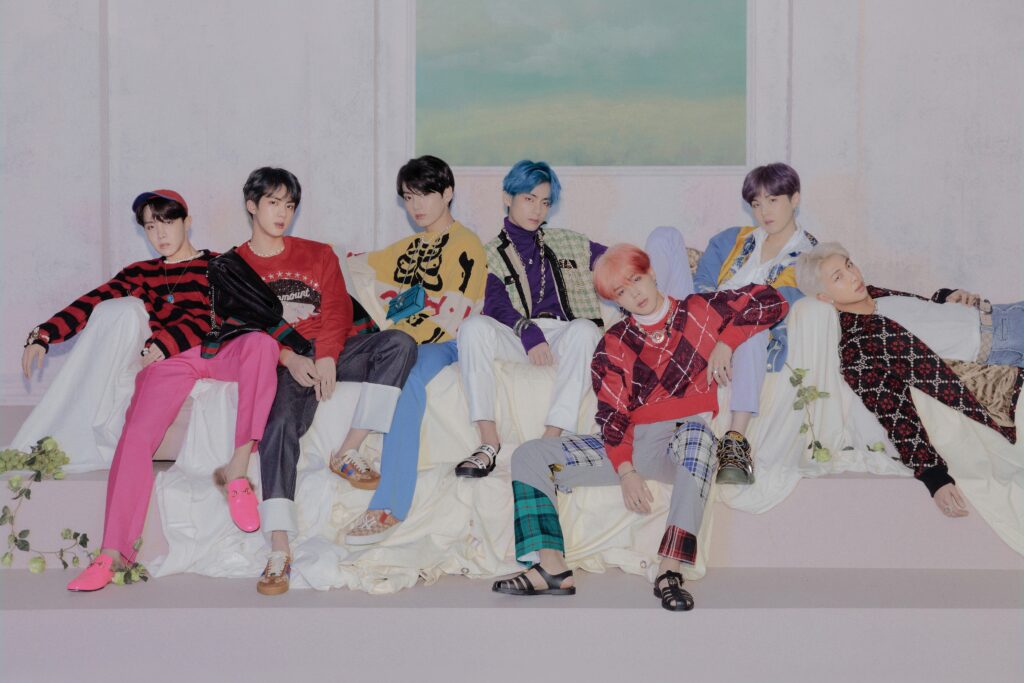Madvillainy: In Memoriam of MF DOOM, Music’s Greatest Supervillain
Written by Julianna Smith on April 12, 2021
Let’s dive into “your favorite rapper’s favorite rapper“, MF DOOM‘s album, track by track.
Daniel Dumile, aka MF DOOM, remains one of the greatest figures of 90’s-2000’s hip hop. With his creative lyrics, dedication to small labels, and collaborations with producers such as Madlib, it’s no surprise his influence extends even to artists such as The Weeknd, Earl Sweatshirt, Drake, and many more.
Dumile’s signature flow isn’t praised for its speed or vocals necessarily, but it is highly regarded for its ‘Shakespearean rhythm’ and lyricism. His work consists of long rhyme schemes, chained together at length rather than following the more common couplet pattern. In this album, Dumile weaves his genius lyrics in with Madlib’s unusual rhythms, a symbiotic relationship connecting the verses and signature 2000’s hip hop instrumentals.
Daniel Dumile and producer Otis Jackson, Jr. (aka Madlib) released the 2004 album Madvillainy together, under the pseudonyms Madvillain and Madlib. It’s been known as MF DOOM‘s masterpiece and a landmark of 21st-century hip hop ever since. Madvillainy opens with “The Illest Villains”, an expository track laced with samples and a Transatlantic-accented narrator, who introduces the dastardly two men of the album: Madvillain and Madlib. This track establishes the tone for the album as dark, setting up Madvillain and Madlib as comic book-style supervillains–simply evil figures identifiable by their “dastardly doings” and malicious intent.
After the equally haunting and thrilling first track, the album moves into “Accordion”. The track departs from the choppy pacing of the album’s opener and allows MF DOOM’s lyrical ability to shine through. Madlib’s production coupled with Dumile’s seemingly effortless flow is a huge success on this track. MF DOOM’s chilled confidence adds a level of supervillain cool, and (like he says) “he hold the mic and your attention like two swords”.
Following these two tracks comes “Meat Grinder“, a track with legitimately insane production by Madlib. The line “straight off the meat grinder” appropriately alludes to the fresh production by Madlib on this track. “Bistro” follows, the first interlude on the album, and the first to include R&B style female vocals. MF DOOM welcomes us to “the debut grand opening of Madvillain Bistro Bed and Breakfast Bar and Grill Cafe Lounge On the Water”–the long name fitting the luxurious production and flow of the track.
The track “Raid” comes next, followed by “America’s Most Blunted“, one of the most impressive shows of Madlib’s production so far on the album. “America’s Most Blunted” comes with a seamless transition into “Sickfit“, the album’s first instrumental track, which itself transitions beautifully into the laid-back eighth track, “Rainbows”.
“Rainbows” ends with a return to the 20th-century, comic-book-style narration, which abruptly ends as “Curls” opens. Relative to the songs so far, “Curls”‘ instrumentals begin refreshingly light, then gradually add in eerie, supervillain-theme-sounding musical lines, beginning about a third of the way in. The track is deceivingly light, and without closely listening it’s almost easy to miss just how many brilliant lines Dumile effortlessly packs into it. The instrumental “Do Not Fire!” follows, reminding us (in case we’d somehow forgotten) the extent of Madlib’s producing genius. The track is laden with cartoonish evil laughter, continuing the comic-style evil theme of the album.
“Money Folder” fits the musical tone of the rest of the album, but its main importance is how it reveals MF DOOM’s villain motif. He says, “don’t sign me, i’m about to get a mil’ without ‘em, crowd him off the shelf, he’s the villain, and what about him?” revealing how labels haven’t worked out great for him in the past, resulting in his independence as an artist and continuing his illustration of himself as a villain—unwanted by the masses, but successful in his own right. And, of course, his success is huge and hugely profitable.
“Money Folder” leads into “Shadows of Tomorrow”, a track which explores the relationship between the past and future with the lyrical finesse that only Dumile possesses. Continuing the concept opened by “Money Folder”’s last line, (“very well then, a duel to the death”) this track’s ‘thesis’, so to speak, argues that death is the finite outcome of the struggle—in this context, between the past and future.
“Operation Lifesaver AKA Mint Test“, follows. This track departs slightly from the somewhat ominous undertones of the previous “Shadows of Tomorrow” as Madvillain tries politely to save himself from a girl with awful breath (thus, the brilliant title: Operation Lifesaver, like the mint). More than anything, this track is a reminder of just how witty MF DOOM’s lyrics are.
Next up: “Figaro!” The track opens with an agitated instrumental line which dials down again when Madvillain starts to rap. In my opinion, this track has some of the greatest lyrics of the album—if not of all of MF DOOM’s discography. And, of course, in classic MF DOOM fashion, the line “figaro, figaro” likely references one of the most challenging, wordy pieces in opera—a song from The Barber of Seville called “Largo al Factotum”. Even when he’s patting himself on the back, his genius lyricism and references shine through.
“Hardcore Hustle” comes next, a brief track with one of the most distinctive outros on the album (samples representing a mic being shoved through a person’s heart—like, the literal organ). The high-energy track features Wildchild and then moves into “Strange Ways“, the climactic 16th track of the album. “Strange Ways” keeps with the pattern of samples for background vocals, which Madlib has used in the past three or so tracks.
Madvillain asks in “Strange Ways”, “now, who’s the real thugs, killers, and gangsters?”, alluding to the police violence, and the hypocrisy of the criminal justice system. This elaborates on the album-wide concept of villainy, asking who’s really at fault in a flawed system? Madvillain challenges the common perspective that police and law enforcement are heroes—to those struggling, breaking the law just to stay afloat, police who criminalize their means of survival are the real thugs. Furthermore, Dumile elaborates on this concept by touching on numerous hypocrisies, of the U.S. specifically. He points out that “only one side’s allowed to have bombs” and still be regarded as heroic—the “other” side will only ever be seen as the villain. This track is absolutely phenomenal. It’s a huge turning point in the album as well, revealing MF DOOM’s true purpose in his usage of the villain motif.
In “Fancy Clown“, the next track, Viktor Vaughn (one of Dumile’s many characters) pays a visit. Viktor threatens to punch “his (MF DOOM’s) tin crown face in,” referencing MF DOOM’s signature silver mask. (Note to any Tyler, the Creator, fans: his usage of alter egos such as Goblin and Wolf is in the same style as MF DOOM uses here. Kind of cool!) The layering Madlib achieves in this track is massively impressive, as well as Dumile’s ability to weave together a storyline using multiple of his own alter egos.
Stacy Epps appears as the lead vocalist in “Eye“, the next track. This is possibly the most musical track on the album, with Epps’ ethereal vocals layered in with trippy, soft instrumentals with a solid beat underlying it all. “Supervillain Theme” follows, the third instrumental track on the album, as the album continues winding down. The creeping chord progression in this track is musically entrancing, and a sharp departure from the delicate tone of the “Eye”.
“All Caps” is next. This track is one of the most notable in MF DOOM’s discography, due to its distinctive chord progression and heavy beats, as well as the lyric perhaps best known in all of Dumile’s writing: “just remember ALL CAPS when you spell the man’s name”. If you’re looking for an introduction to MF DOOM’s work, this song is probably a good place to start.
Madvillainy concludes with tracks “Great Day” and “Rhinestone Cowboy”. “Great Day” is a charming track, laden with clever lyrics and a somewhat optimistic instrumental tone. And finally, “Rhinestone Cowboy“: another optimistic-sounding track which opens with a crackly sample of some speaking and applause. The applause sample continues periodically throughout the song, which acts like the credits track which might follow a mid-20th-century superhero film.
Final thoughts: It’s safe to say that an album like Madvillainy never existed before it; its unusual beats, MF DOOM’s effortlessly chill rapping, and the surprising use of villainy to tie the album together, conceptually. MF DOOM’s genius ensures the seamless integration of all the moving parts of the album, including the supervillain motif, his signature flow, and Madlib’s distinctive beats and melodies. The 22-track Madvillainy is indeed a masterpiece.
To check out the album in its entirety listen here,
Author
Julianna Smith
You may also like
Continue reading





